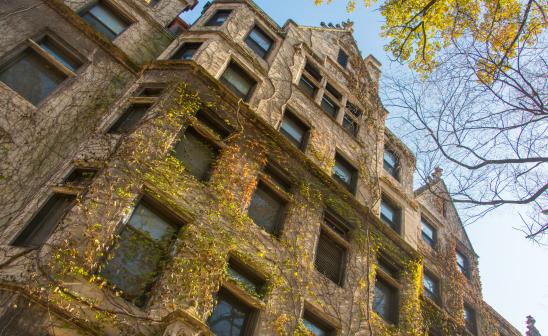Alumni share insight on what they wish they knew in graduate school

By Sarah Steimer
Even the best-laid plans are subject to change, and coming to accept that challenging truth is essential to one’s well-being.
While it may not be the easiest advice to hear, that key takeaway was made by all speakers on an April 5th Alumni-in-Residence panel discussing what they wish they knew in graduate school. Neil Roberts, PhD’07 (Political Science), Jasmine DeJesus, PhD’15 (Psychology), and Antonio Sotomayor, PhD’12 (History) each underscored their nonlinear career trajectory, suggesting not every step in a student’s path may lead them where they expect, but each twist and turn is a learning experience.
“A big theme that runs through all these experiences is that a big part of graduate school and academia in general is just putting yourself out there,” said DeJesus, now an assistant professor of psychology at The University of North Carolina at Greensboro.
The conversation, attended by 45 graduate students, post-docs, and recent alumni, boiled down to being OK with the unexpected — and sometimes the unanticipated in academia could be the best part or your saving grace. Likely everyone knows a fellow student who changed their major, or whose research agenda shifted because of a discovery, said Alumni-in-Residence Neil Roberts, PhD’07 (Political Science). And if the pandemic taught us nothing else, it’s that anything can change in an instant.
Be OK with different measures of success
“Celebrate every time you feel like you've realized what might be interpreted as thriving,” said Roberts, paraphrasing a graduate student he once overheard. The chair and professor of Africana Studies at Williams College emphasized the need to celebrate those wins: “Just give yourself that moment, give yourself the small ‘W.’”
Similarly, Sotomayor emphasized the importance of setting small goals. The associate professor, historian, and librarian of Latin American and Caribbean Studies at the University of Illinois at Urbana-Champaign said his workload often seemed completely overwhelming. While it was important to him to have an end goal, the small daily or even hourly tasks — and accomplishments — matter.
“You take little steps every week, and then try to find the bigger picture and mold those little blocks together,” Sotomayor said.
Roberts reiterated the need for short- and long-term goals, but to remember that your life may not go along the trajectory you expected. “It's very difficult to accept [the changes],” he said. “But in many regards, those are the moments that actually tend to define us. We might not know it at the time, but those are the moments.”
Be OK asking for help
Although asking for help may not come naturally to hard-working students, it’s not a sign of weakness to seek assistance or delegate.
“Sometimes what helps you thrive is realizing that you don't have to do every single thing yourself,” DeJesus said. “It can be really easy, especially as a graduate student, to feel like, ‘Oh, I need to do this on my own to show that I'm capable and just show that I know everything and that I have what it takes to succeed.’”
From her own experience, DeJesus said she’s learned to reach out to other experts on her own campus when she has tasks that aren’t in her wheelhouse. Rather than struggle through the project alone, she can focus on the piece that requires her expertise and delegate the rest to others.
Be OK with having something else to bring you joy
It’s easy to let your academic career become central to your life, but the panelists made the argument for fulfillment elsewhere.
DeJesus, for example, listed hobbies she’s cultivated over the years, from a food blog to sewing. “You have to have something besides just the projects that you're working on and your academic life, because there are ups and downs,” she said. “Just like any other kind of profession you might choose, you have to have other things that are going to give you meaning and make you feel happy.”
Sotomayor echoed DeJesus, saying he made the conscious decision that his academic career was not his life. “I'm a brother, I'm a husband, I'm a father first,” he said. “And then this is my job, this is my work.”
Both DeJesus and Roberts acknowledged that striking a work-life balance is still a work in progress for them both, but Roberts said the trick for him was physical space. While in school, he felt he could separate his academic and personal life better by moving away from campus. “I was all in, but I had this spatial break,” Roberts explained. “I just needed a time to disconnect.”
Whatever the method, Roberts said, it’s crucial to protect your time.
The next Alumni-in-Residence event will be Tuesday, April 27, at 10 AM CDT. Alumni-in-Residence David Bholat, PhD’12 (Anthropology) will lead a workshop designed to demonstrate how PhD students and recent graduates can draw on their entrepreneurial experience and research skills to find jobs outside the academy. Learn more and register here.
The Alumni-in-Residence Program was launched in February 2021. Because Social Sciences alumni are thought leaders not only in research and higher education but also across a wide range of organizations, industries, and interests, their varied pursuits and experiences offer broad frameworks and models for current graduate students considering their own career aspirations. Through this exciting initiative, accomplished alumni engage with the Division’s programs and students in myriad ways, including 1:1 conversations, engagements with departments and degree programs, group events, and other programming. Learn more here or contact Chaevia Clendinen, Assistant Dean for Student Advancement and Diversity.
 THE UNIVERSITY OF CHICAGO
THE UNIVERSITY OF CHICAGO

